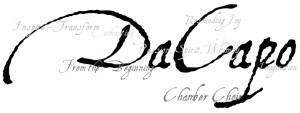The DaCapo Chamber Choir gave an outstanding performance Saturday night at St John the Evangelist in Kitchener, an outcome that occurs with such regularity it isn’t really news.
For the last concert of their 10th anniversary season, DaCapo finished up their Earth, Water, Fire & Air- themed season with the last two elements.
The evening opened with a long note improvisation. Function (mimicking the Introit in Anglo-Catholic liturgy) was more important than substance in this case and the improvisation provided an imaginative way for the audience to transition from chatting to listening without the traditional ritual of applause.
Three Canadian compositions were featured in the first half: O ignis spritus by Imant Raminsh, Jeff Enns’ Moonset and Nocturne by DaCapo conductor Leonard Enns. Of the three, it was Leonard Enns’ that was the most interesting. In the notes Enns explained that he was trying to create a picture of, “the stars playing hide and seek with the curtains of northern lights.”
In another set of hands, the result would be gimmicky but Enns never gives in to gesture for its own sake. His recreation of the night sky was magical and begged for a performance lit by the real thing.
Martin Nagtegaal, the originally-scheduled organist, was sadly indisposed at the last moment. Happily, Barrie Cabena was available and able to fill in.
In addition to being a well-respected organist Cabena is also a prolific composer. His piece Clouds-Seven Vignettes for Organ, Op 550 was weaved through the choral selections to provide a contrast in both soundworld and compositional style.
Clouds owes a large debt to 20th-century French organist-composers like Olivier Messiaen. For the first four vignettes, Cabena chose stops that made the organ sound like the space-age squawks and chirps of a 1960s synthesizer. Not one for even a modest display of showmanship, Cabena was off the bench and had changed his glasses before the audience realized the first batch was over.
The Searching Sings, by R. Murray Schafer was composed especially for DaCapo and received its world premiere Saturday evening.
Schafer’s work has been critically acclaimed for years although judging solely on this piece, it is difficult to appreciate why. Aside from a momentary marvelling at the human voice’s ability to reproduce the sounds of nature, there was little else about the piece to recommend additional performances.
Focusing on contemporary unaccompanied music comes with its own set of challenges. Complex harmony, disjunct intervals and more adventurous voice leading means each choir member must be completely secure in their part and confident enough to sing it independently from section mates that are often on the other side of the stage. This music does not accommodate drafting.
This season, there were a few new in the choir and while the overall sound was not adversely affected, the change was most noticeable in the sopranos where the singers didn’t always agree on the pitch or pulse.
The final piece on the program was Leonard Enns’ I saw eternity, which explores the idea of our time on Earth as the briefest of seconds in the context of eternity.
Once again, Enns’ shows his absolute mastery of colour and texture, using harmonics to represent the elusive, fleeting quality of temporal restrictions.
With the curtain barely down on their first 10 years of concerts, DaCapo is already looking forward to the next ten. With a choir as adventurous and open-eared as DaCapo, there’s no telling where they’ll end up. What is certain, however, is that the ride will be just as exciting as the destination.



